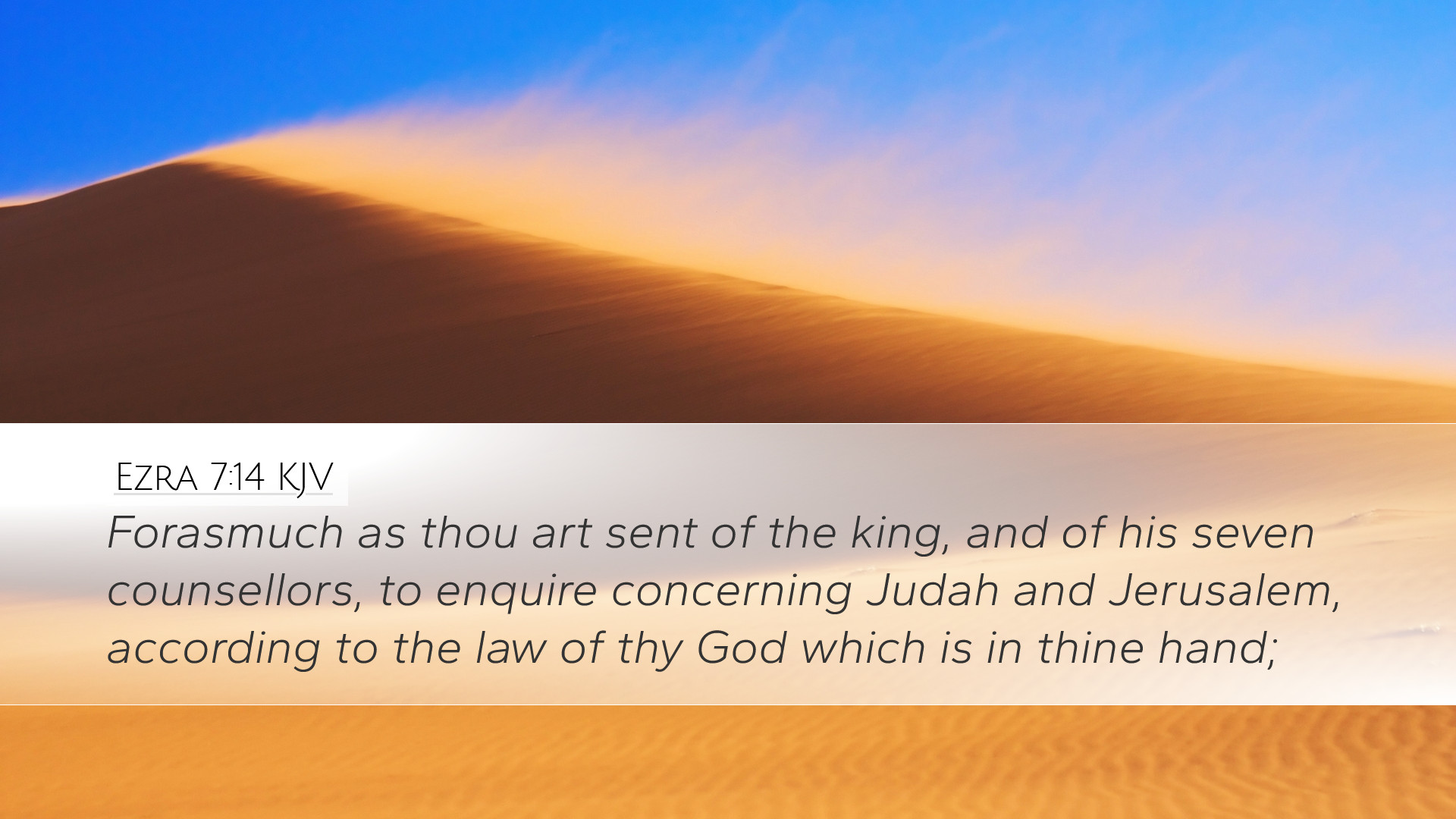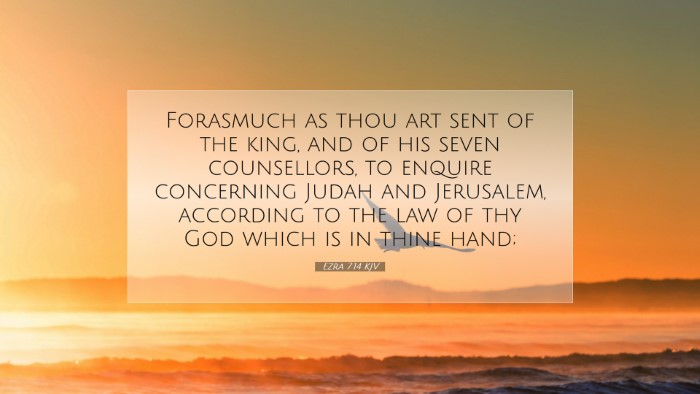Old Testament
Genesis Exodus Leviticus Numbers Deuteronomy Joshua Judges Ruth 1 Samuel 2 Samuel 1 Kings 2 Kings 1 Chronicles 2 Chronicles Ezra Nehemiah Esther Job Psalms Proverbs Ecclesiastes Song of Solomon Isaiah Jeremiah Lamentations Ezekiel Daniel Hosea Joel Amos Obadiah Jonah Micah Nahum Habakkuk Zephaniah Haggai Zechariah MalachiEzra 7:14
Ezra 7:14 KJV
Forasmuch as thou art sent of the king, and of his seven counsellors, to enquire concerning Judah and Jerusalem, according to the law of thy God which is in thine hand;
Ezra 7:14 Bible Commentary
Commentary on Ezra 7:14
Ezra 7:14 states:
"Forasmuch as thou art sent of the king, and of his seven counselors, to inquire concerning Judah and Jerusalem, according to the law of thy God which is in thy hand."
Introduction
This verse serves as an introduction to Ezra's mission to Jerusalem. It highlights Ezra's authority conferred by the king and emphasizes the significance of God's law in his undertaking. This commentary will draw from the insights of public domain commentaries, enriching our understanding of the themes present in this verse.
The King's Commission
The text indicates that Ezra is sent by the king, showcasing a divine orchestration in providing authority for religious reform. As Matthew Henry notes, the king represents earthly authority while Ezra represents divine purpose:
- Historical Context: The Persian king's support is critical for the restoration of Jewish worship, indicating a shift in the political landscape where God's people are recognized and assisted in their endeavors.
- The Role of Counselors: Ezra is sent along with the king’s seven counselors, reflecting a collective decision rooted in counsel. Albert Barnes emphasizes the diplomatic nature of this mission, as Ezra must navigate both religious and political nuances.
Inquiring Concerning Judah and Jerusalem
This phrase encapsulates Ezra's mission. The term 'inquire' suggests a thorough investigation, reflecting Ezra's commitment to understanding the state of the Jewish community. Adam Clarke points out:
- Spiritual Restoration: Ezra's inquiry is not only about physical or political conditions but also spiritual health—indicating a holistic approach to ministry.
- Judah and Jerusalem: These refer to the core of Jewish identity and worship, signifying that the reformation will be centered on restoring true worship in the heart of their culture.
According to the Law of Thy God
Ezra's mission is framed within the confines of God's law. Here, Matthew Henry reiterates the importance of adhering to divine instruction:
- Authority of Scripture: The law of God is both a guide and a standard. Ezra's ministry is dependent on his fidelity to Scripture, which serves as the ultimate authority—critical for any leader of God's people.
- Restoration of God’s Ways: Ezra’s adherence to the law indicates that any reconstruction of spiritual life must be rooted in God’s Word, emphasizing the necessity of scripture in ecclesiastical matters.
The Law in Thy Hand
This phrase indicates Ezra's preparedness and personal commitment to the law. Albert Barnes comments that having the law in hand symbolizes:
- Personal Ownership: Ezra’s intimate relationship with the Scriptures indicates that he is not merely a messenger but a practitioner, which empowers his leadership.
- Equipped for Ministry: Being in possession of the law equips Ezra to execute his mission with authority, stressing the importance of being well-versed in God’s Word for effective leadership and ministry.
Theological Implications
Ezra 7:14 presents several theological insights valuable for pastors, students, and scholars. Here are key considerations:
- Divine Sovereignty: The endorsement of Ezra's mission by a foreign king highlights God's control over nations and circumstances to fulfill His purposes.
- Integration of Faith and Practice: The emphasis on God's law underscores the need for an integrated life where belief and practice converge, a vital principle in Christian discipleship.
- Importance of Leadership: Ezra serves as a model leader—committed to God, equipped with His Word, and sensitive to the spiritual needs of the people.
Conclusion
In summary, Ezra 7:14 encapsulates the essence of a divinely appointed mission focused on renewal through obedience to God's law. The interplay of earthly authority and divine mandate encourages contemporary leaders to uphold Scripture as the foundation for ministry. As we reflect upon Ezra’s example, may we be encouraged to inquire deeply into our communities, govern our work by the Word, and recognize the sovereignty of God in leading concerted efforts for spiritual restoration.


